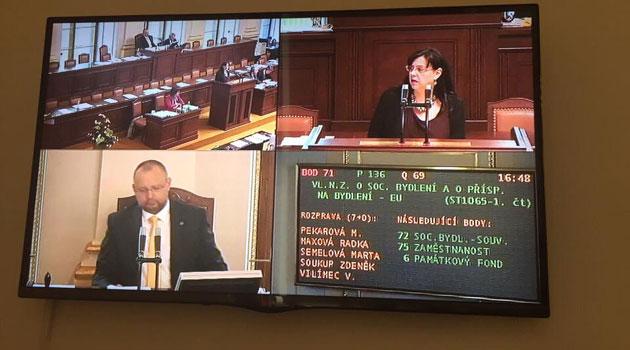Czech senators want Constitutional Court to address housing benefit legislation

Twenty Czech Senators are turning to the Constitutional Court regarding the disbursal of housing benefits. They have sent the court a motion for abolishing part of the law on aid to those in material distress according to which local councils can declare so-called “areas with increased incidence of undesirable phenomena” on their territories.
New applicants for housing benefits will not be allowed to receive them in the areas so designated. Czech Senator Renata Chmelová informed the press about the motion on 6 December.
The senator said legislators from all clubs in the Senate have signed on to the motion. “If a municipality declares such an area, then the people who conclude new rental contracts for properties in that locality will no longer be able to claim housing benefits. People in residential hotels conclude most of their contracts three months at a time. The question is what position the Labor Office will take toward continuing their benefits when they renew their contracts,” she said.
Chmelová said the rules will especially impact children and their mothers, senior citizens who have ended up in need and are attempting to find new accommodations, and youths aging out of children’s homes. The opportunity to declare areas as ones with “increased incidence of socially undesirable phenomena” in places where public order is disrupted, where children are endangered, or where persons are under the influence of alcohol and drugs was given to local authorities by this year’s amendment to the law on aid to those in material distress.
The Labor Office cannot disburse housing benefits to new applicants in such localities. According to the Platform for Social Housing, the restrictions are already in place in 12 cities and towns, while another 30 are considering them.
According to previously reported information, housing benefits will no longer be paid to people in some areas of the town of Sokolov. Certain buildings and streets also are proposed for exclusion from eligibility for benefits by the towns of Přerov and Ústí nad Labem.
According to Czech Senator Jiří Dienstbier (Czech Social Democratic Party – ČSSD) of Kladno, that town wants to declare its entire territory a problem area. “Kladno has probably conceived the most absurd form of the opportunity to enact such measures. It has proposed declaring the entire territory of the town as such a ghetto. I do not believe the residents of Kladno think they are living in a ghetto,” he said.
Dienstbier said he believes the measures also have a constitutional dimension. “Aid to those in material distress is an entitlement that is guaranteed by the Charter of Fundamental Rights and Freedoms. It is not acceptable that in Beroun, for example, a citizen would be able to claim such a benefit while in Kladno a person in the same situation would not be able to access such aid,” he said.
The senator also pointed out that the law currently does not make it possible for local authorities to establish exceptions to these rules. The restriction of housing benefits in the so-called “areas with increased incidence of undesirable phenomena” has been criticized by organizations aiding people in need such as, for example, Caritas Czech Republic.
The Czech Government Council for Romani Minority Affairs also disagrees with the measures. At the beginning of November the council called on the Labor Office to advocate for removal of the paragraph with the rule from the amendment to the law on aid to those in material distress and to “arrange for citizen’s rights and other principles of the rule of law to be upheld.”
The council said the change would not contribute toward ameliorating negative social phenomena, including poverty, but would, on the contrary, further exacerbate such phenomena. People in need will probably choose to move to localities where they can still access the aid.
The Forum of Prague Senators, which brings together members of the upper chamber representing all the electoral precincts in the capital, is behind the motion to abolish the law. Their motion with its 20 signatures was sent to the court electronically.
